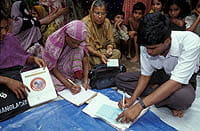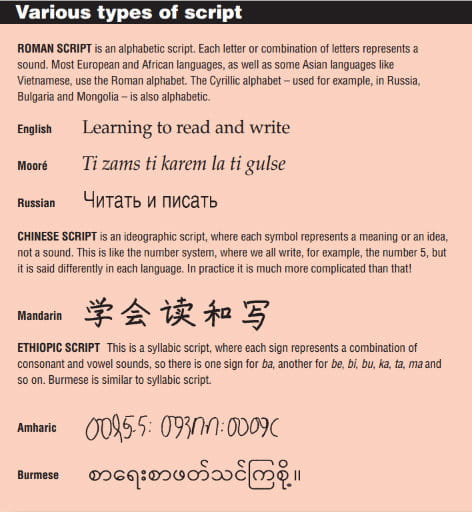by Clinton Robinson.

Articles
Literacy – a moving target
Literacy is often said to be a key to development – but what does that really mean?
2005 Available in English, French, Spanish and Portuguese

Photo: Richard Hanson/Tearfund
Literacy is often said to be a key to development – but what does that really mean? Does it mean that those who can read and write are better placed to improve their lives? Or that once a community is routinely reading and writing, development can take off? Or does it mean that life is simply better when we can read books and write letters?
Literacy is a complicated issue that links in with many different aspects of life. Also, views about what literacy means have changed in recent years.
Focus on ‘ABC’
Many people still think of literacy as simply knowing the alphabet and being able to read words on a page. This was a common view about 50 years ago, when schools and adult literacy classes made sure that people knew their letters and could write them properly. It did not matter so much what there was to read, or what kind of writing people did. Of course, literacy does involve knowing what the words say, but there is more to it than that.
Focus on learners
More recently, literacy has been seen as empowering. It offers learners and their communities the chance to make a difference in their own lives and to take charge of their own development. This approach starts with the situation of the learners themselves. It looks at how literacy best fits in with what they already know, with how their society works, and with how they can increase their political voice. Paulo Freire, the Brazilian educator, is well known for basing literacy training on the knowledge and circumstances of the learners so that they could bring change to their community. Literacy can be considered a condition for democracy and political participation. Since people and communities are different, so are the uses of literacy. In recent years, educators have begun to talk about ‘literacies’ in the plural – because of the many different contexts, purposes and languages in which literacy can be used.
Focus on livelihoods
This empowering view of literacy is developed further by linking it with livelihoods – how will literacy best serve people in order to make a living? This comes from the poverty reduction approach to development. The aim is to enable people to have new productive opportunities through literacy – greater income, jobs, new skills, and enterprise development.
Providing opportunities
What do these different views mean for those working to help others acquire literacy? The evolving views on literacy emphasise what really matters: motivation to learn, and opportunity to use what is learnt. These are closely linked. Where literacy provides new opportunities, people will want to become literate. There are three very important factors in offering relevant opportunities for people to learn to read and write:
Where literacy learning takes place Instead of organising literacy classes, it is better to link literacy with other skills people want to learn. So literacy might be combined with learning how to manage micro-credit, with reproductive health education or HIV and AIDS prevention. Women’s groups in northern Ghana have been effective in making literacy a tool for learning essential knowledge about community development in this way.
How literacy learning takes place As adults, we learn best when we can relate new knowledge to what we already know. The Reflect literacy method does this by having learners talk about their area, their health, their yearly farming cycle, or their community decision-making – all things they already know a lot about. Together they create charts and texts to put their knowledge into a written form. The facilitator guides and suggests, but the learners are in charge of the process. They determine both the pace of learning and the content. Reflect also stimulates discussion about how life could or should change and what people themselves can do about it. Reflect is now widely used in literacy learning and community mobilisation around the world.
What people use literacy for In the past people have acquired literacy simply because it seemed a good thing to do. People need real opportunities to use literacy. Are there useful and interesting things to read? Are there possibilities to write and publish at the local and national levels? These are key questions to ask before organising literacy learning. Children and adults may lose their literacy skills if they have few opportunities to use them. This problem is a major concern where literacy in a minority language is developing for the first time.
The church has often supported literacy training to help people to read the scriptures for themselves. Literacy programmes should include plans for enabling local authors to produce literature that people want to read. As well as useful information on health and development, this should include interesting and amusing stories and news about football, local society and what’s going on in the world.
Languages and scripts
One aspect of the many ‘literacies’ in the world is the variety of languages and scripts that people use. In most parts of the world, people need to learn literacy in more than one language, starting with their own local language or mother tongue. Then they add other languages that they may need, such as Hindi and English in India, or Lingala and French in Congo. In most parts of Asia, this involves learning different scripts or writing systems. In China some minorities learn their own language in the Roman script, then add Mandarin in Chinese script. Similarly, in Ethiopia local languages are often in Roman script, but Amharic, a widely used language, is in Ethiopic script. These scripts are very different (see box below).
In our globalised world, there will be an increasing need to become literate both in different languages and different scripts.
Today we know that literacy is far more complex than was once thought. It is more necessary than ever – everyone’s lives are affected by decisions that are made by those who are literate. Literacy can give some people power over others. Literacy enables people to take a fuller part in society, to have an influence and make their voices heard. Computers can be an essential part of making decisions, and knowing how to communicate using written text gives access to these new technologies.
Literacy is not the key to all development, nor will it solve all daily problems at local level. However, it is a right that should be available to everyone so that they can express themselves freely through writing, and look critically and carefully at the written texts that those in power produce. Literacy, in relevant forms, is a means of empowerment, today more than ever.
Dr Clinton Robinson works as an independent consultant focusing on education and development. His special interests are adult and non-formal learning, literacy, and social development. His address is 38 Middlebrook Road, High Wycombe, HP13 5NJ, UK. E-mail: [email protected]

Similarly Tagged Content
Share this resource
If you found this resource useful, please share it with others so they can benefit too.

Subscribe to Footsteps magazine
A free digital and print magazine for community development workers. Covering a diverse range of topics, it is published three times a year.
Sign up now - Subscribe to Footsteps magazine



